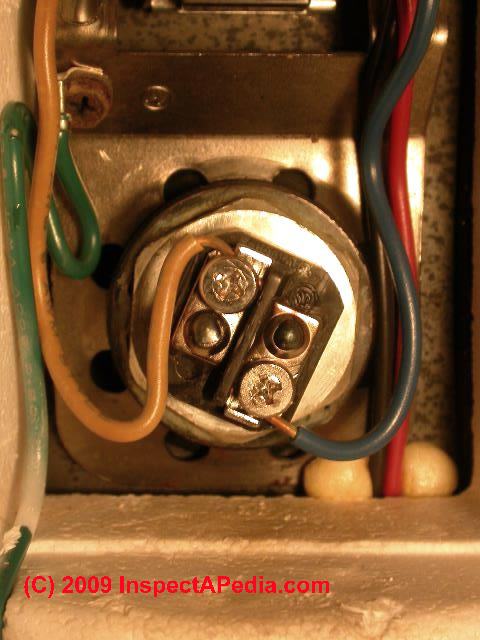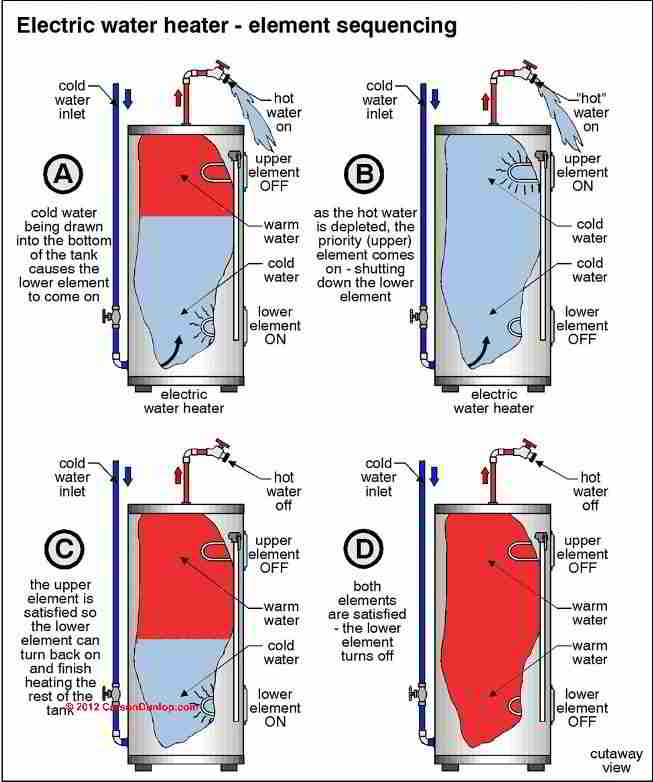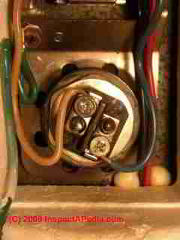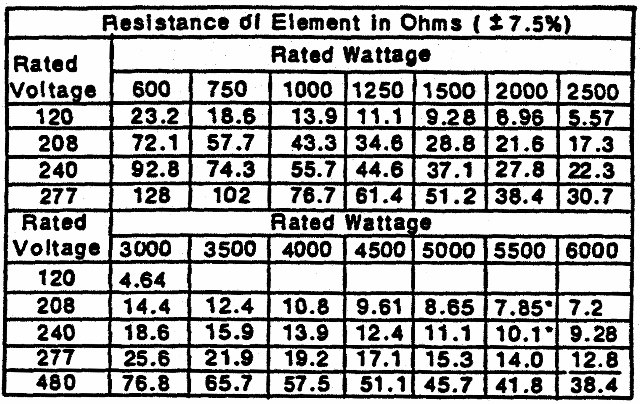 How to Test for a Bad Electric Water Heater Heating Element
How to Test for a Bad Electric Water Heater Heating Element
Diagnose electric heater elements for geysers,
water cylinders, electric water heaters
- POST a QUESTION or COMMENT about how to test the heating elements on an electric water heater
Electric water heater element test procedure:
This article describes how to test electric hot water heater heating elements, what readings to expect if using an ohmmeter.
We list the steps in testing electric hot water heater heating elements, following that by a guide to replacing a bad heating element.
This series of articles describes how to inspect, operate, diagnose, and repair electric hot water heaters. The articles at this website will answer most questions about electrical water heaters as well as many other building plumbing system inspection or defect topics. Reproduction of this web page electronically at other websites is prohibited.
InspectAPedia tolerates no conflicts of interest. We have no relationship with advertisers, products, or services discussed at this website.
- Daniel Friedman, Publisher/Editor/Author - See WHO ARE WE?
How to Test Electric Water Heater Heating Elements
 Operating Sequence of Electric Water Heater Elements upper and lower heating elements
Operating Sequence of Electric Water Heater Elements upper and lower heating elements
Electric water heaters have two heating elements - thick metal loops that get hot when electricity flows through them, similar to the burner on an electric range.
The lower heating element heats cold water as it enters the hot water tank. (Incoming cold water is delivered to the bottom of the tank through the dip tube.)
This element works the hardest, is on the most, and so often is the first to burn out.
The upper heating element acts as a "booster" to heat water when there is a high demand. This element heats only the water in the upper portion of the hot water tank.
As we introduced earlier, if there is some hot water but it is limited in quantity or temperature, just one of the heating elements may have failed.
The water heater operating sequence sketch just above is provided courtesy of Carson Dunlop Associates, a Toronto home inspection, education and report writing tool. Used with permission.
Note: Once you have diagnosed which heating element is bad, also
see ELECTRIC WATER HEATER ELEMENT REPLACEMENT
Because the electric water heater might be failing to work due to loss of electrical power to the unit, or because of a malfunctioning high-temperature cutoff switch, you should also see the test steps
at ELECTRIC WATER HEATER HIGH TEMP CUTOFF TEST
Electric water heater drawing (left) showing the sequencing procedure for electric water heater elements is provided courtesy Carson Dunlop Associates, used with permission
Scale coating a water heater element can also reduce the quantity of hot water (or cause heating element failure) - a topic we review in more detail
at WATER HEATER SCALE DE-LIMING PROCEDURE
and
at WATER HEATER NOISE DIAGNOSIS, CURE
If the electric water heater produces the same old quantity of hot water, but water is only tepid rather than hot,
we suspect that the top water heater element has burned out.
The bottom element is heating the entire tank but it is not capable of heating the water to the same high temperature as if both elements were working. Long tepid shower - bad top water heater element.
If the electric water heater produces the same old hot water temperature, but the quantity seems drastically reduced, we suspect that the bottom water heater element has burned out. Only the water in the top of the tank is being heated.
Cold water enters and remains at the bottom of the water heater. So our hot water is plenty hot but we run out in just a few minutes. Short hot shower - bad bottom water heater element.
As we're about to show in detail, one can test a water heater heating element
by a simple procedure using a continuity tester or a volt-ohm meter- a VOM.
See DMM DIGITAL MULTIMETER HOW TO USE
For details on how to use electrical test equipment see DMMs VOMs SAFE USE OF
and see VOLTS / AMPS MEASUREMENT EQUIP
Steps in Testing an Electric Water Heater Heating Element - Good Method
 Reader Question: our water won't get hot - electric water heater
Reader Question: our water won't get hot - electric water heater
Water will not get hot when turn on hot water in house - Claude 11/29/12
Reply:
Claude, you may need to replace your water heater elements. See the test steps given in the article below:
- Turn off electrical power to the water heater
You should have done this earlier if you read the instructions above. Turn off power at the water heater circuit at the main electrical panel. - The water in the heater should be lukewarm or colder
If the water heater is hot, run hot water in the building (with the water heater electrical power OFF) until water flows lukewarm or colder. - Disconnect the electrical wires at the heating element terminals.
(This is so whether testing upper or lower heating element). - Test for current flow
Use a VOM, DMM, or Ohmmeter or multimeter set to read "resistance" or "ohms" as follows: connect one alligator clip or touch one probe of the VOM to each terminal on the water heater element.
One probe touches one terminal, the other probe touches the other terminal. If the Ohmmeter needle doesn't move (or no reading is given on the DMM) then the electric water heater heating element is defective and needs to be replaced.
If the ohmmeter needle moves or you get some Ohm reading (other than infinity) then the heating element is OK and you are ready to test the other heating element on the heater. In sum, if there is "continuity" through the heating element it is working. If there is no continuity (no electrical current can flow) then the element has failed.
Testing an Electric Water Heating Element for a Short Circuit
Crude Method & OHM Table for Water Heater Elements
 We do not usually make this test but we include it here as it appears in some diagnostic procedures for electric water heaters. The water heater element OHMS chart (left, courtesy A.O. Smith) describes the actual ohm reading you'd expect if testing a factory OEM heater element of the wattage shown.
We do not usually make this test but we include it here as it appears in some diagnostic procedures for electric water heaters. The water heater element OHMS chart (left, courtesy A.O. Smith) describes the actual ohm reading you'd expect if testing a factory OEM heater element of the wattage shown.
Even without that level of detail there is a simple test you can perform to see if an electric water heater heating element is in good working order:
- Turn off electrical power to the water heater
You should have done this earlier if you read the instructions above. Turn off power at the water heater circuit at the main electrical panel. - Remove the access panel cover
and insulation from the top or bottom water heater element (described above) - Connect the alligator clip
or test terminal of your continuity tester to one terminal of the heating element. That's the wire and screw right on the heating element itself. - Connect the other probe
of the continuity tester (or VOM) to a bolt or bracket that holds the heating element in position. - If the test light goes on
or the buzzer sounds, or your VOM (set to Ohms) indicates continuity, there is a short circuit in the heating element and it needs to be replaced.
More water heater element test recommendations are in the Residential Gas and Electric Water Heater Handbook [PDF] provided by A.O. Smith and linked-to atReferences or Citations
Causes of Heating Element Failure on Electric Water Heaters
Besides old age and high usage, if your building water supply provides hard water (high in mineral content), scale build-up on water heater elements can lead to their demise.
See WATER HEATER NOISE DIAGNOSIS, CURE for details about removing scale from a water heater.
Reader Comments, Questions & Answers About The Article Above
Below you will find questions and answers previously posted on this page at its page bottom reader comment box.
Reader Q&A - also see RECOMMENDED ARTICLES & FAQs
On 2021-01-29 by Anonymous - electric water heater element OK but we run out of hot water
The water heater elements are testing fine but we are still running out of water faster than usual
Reply by danjoefriedman (mod)
Anon
You may know from our articles on this that often when the water is plenty hot but the volume is reduced that means that the lower element is burnt-out or not working.Another "cause" of running out of hot water that is easier to miss is a drop in the temperature of incoming cold water entering the water heater. Especially in cold climates the incoming water temperature can vary considerably between summer and winter weather.
Watch out: if you only tested the water heater elements themselves, you could have missed a differnt cause of thelower heating element not working: a bad lower element thermostat;
More help is at these articles
ANTI_SCALD VALVES & HOT WATER QUANTITY
HOT WATER QUANTITY IMPROVEMENT
WATER HEATER TEMPERATURE TOO COLD or TOO HOT
Testing my water heater element: is my multimeter reading contaminants in the water itself?
My multiple will not work on ohms x 1k it only works on the highest scale and I'm reading continuity through the element .
Could this be reading ingredients through the water because of the high scale and by element be bad ?
Reading of 118 of power going in and out of elements - On 2020-10-23 by John M Adams -
Reply by (mod) -
John
Are you testing the water heater element with
- all power to the heater OFF (so you don't get killed
and
- wires disconnected from the heating element?
If not let's try that.
If you still get infinite resistance or zero resistance then the heater element is probably shot.
What is an acceptable resistance reading, when testing terminal of a water heater element and its body?
What could be a possible fault that cause an electric cattle to trip the earth leakage?
What is an acceptable resistance reading, when testing terminal of an element and its body? - On 2018-10-16 by Zamani -
Reply by (mod) -
Zam
If the ohmmeter needle moves or you get some Ohm reading (any resistance other than infinity) then the heating element is OK .... In sum, if there is "continuity" through the heating element it is working. If there is no continuity (no electrical current can flow) then the element has failed.
Thanks for asking
Watch out: If your electric kettle is causing a circuit breaker to trip or a fuse to blow it has an internal short circuit and is unsafe to use. Replace it.
What safety precaustions should be taken when testing insulation resistance on a water heater circuit?
Two precautions to be considered when testing insulation resistance test on water heater circuit - On 2018-03-21 by Mox -
Reply by (mod) -
Mox
As far as I know the *insulation* resistance is not tested on a water heater element, nor on its wiring, in any normal building test process.
Perhaps we can start by clarifying the question. Good luck on your test.
What's the risk if a wagter heater is overheating
What is the major problem of water heater is over heating - On 2017-12-17
by Anonymous -
Reply by (mod) -
Anonymous,
The major problem of water overheating is scalding burns to building occupants, in extreme cases causing death.
"Best quality thermo stant" is not a phrase I understand.
It sounds as if you're asking quiz questions. Good luck on your test.
Thank you's to and from our readers
On 2024-06-15 by Kathy - This InspectApedia.com site is incredible. I just now I figured out why my shower never got hot
Over the past 3-4 years, I've used it to diagnose and repair 3 issues.
At a previous residence, I learned how to figure out why my baseboard hot water heat was taking a long time to heat up the room.
(Taco circulation pump).
I learned how to prime my boiler and get it firing again, after running it out of oil. (Beckett burner).
I learned to NOT try to turn a seized water valve - because I was not ready for the possible flooding :D
I replaced a washing machine cold water shutoff valve - after having someone else turn the water off at the street.
I just now I figured out why my shower never got hot, this morning. And tomorrow, I'll be replacing my first heating element. :D
Replyl by InspectApedia Publisher (mod)
@Kathy,
Thank you so much for your very kind and generous note.
It's particularly welcome given the current snafu with Google's search engine helpful content update that has in fact directed searches to simpler pages with less content than ours
Indeed our website is here to help you and we also welcome your questions, content suggestions, or criticism. Working together helps us both
Daniel F.On 2024-07-18 by Kathy
@Daniel,
Thank YOU for a wonderful site.
When something is going on that I want to know more about, I come right to this site.
I don't bother to use a search engine.
I've told a bunch of people about the site, saying how I love it and how helpful it is.
I love that it's very detailed, very technical, and even if you start out knowing very little about a system, you can quickly learn some really great basics.
I always refer to my boiler as a boiler now, and never a furnace (anymore). :D
Again... ->> THANK YOU <<-
>Replyl by InspectApedia Publisher (mod)
@Kathy,
Your kind words mean a lot to us, thank you.
We will continue to very much welcome you and will be glad to do our best to answer any questions or concerns that may come up.
Daniel and Amy
On 2023-02-09 by Geoff - InspectApedia is a fantastic resource! THANK you!!
Wow! What a fantastic resource! THANK you!!
Reply by InspectApedia Publisher (mod)
@Geoff,
We are grateful for your nice note. Having worked on this information library for decades, we are really pleased when readers find it trusted and useful.
To that end, we very much also welcome your questions, suggestions, or criticism.
...
Continue reading at ELECTRIC WATER HEATER ELEMENT REPLACEMENT or select a topic from the closely-related articles below, or see the complete ARTICLE INDEX.
Or see ELECTRIC WATER HEATER ELEMENT TEST FAQs - questions & answers posted originally on this page
Or see these
Recommended Articles
- DMM DIGITAL MULTIMETER HOW TO USE
- ELECTRIC WATER HEATER ELEMENT REPLACEMENT
- ELECTRIC WATER HEATER ELEMENT TESTS
- ELECTRIC WATER HEATER REPAIR GUIDE - home
- HOT WATER QUANTITY IMPROVEMENT
- WATER HEATER NOISE DIAGNOSIS, CURE - remove scale from noisy water heater.
Suggested citation for this web page
ELECTRIC WATER HEATER ELEMENT TESTS at InspectApedia.com - online encyclopedia of building & environmental inspection, testing, diagnosis, repair, & problem prevention advice.
Or see this
INDEX to RELATED ARTICLES: ARTICLE INDEX to WATER HEATERS
Or use the SEARCH BOX found below to Ask a Question or Search InspectApedia
Ask a Question or Search InspectApedia
Questions & answers or comments about how to test the heating elements on an electric water heater.
Try the search box just below, or if you prefer, post a question or comment in the Comments box below and we will respond promptly.
Search the InspectApedia website
Note: appearance of your Comment below may be delayed: if your comment contains an image, photograph, web link, or text that looks to the software as if it might be a web link, your posting will appear after it has been approved by a moderator. Apologies for the delay.
Only one image can be added per comment but you can post as many comments, and therefore images, as you like.
You will not receive a notification when a response to your question has been posted.
Please bookmark this page to make it easy for you to check back for our response.
IF above you see "Comment Form is loading comments..." then COMMENT BOX - countable.ca / bawkbox.com IS NOT WORKING.
In any case you are welcome to send an email directly to us at InspectApedia.com at editor@inspectApedia.com
We'll reply to you directly. Please help us help you by noting, in your email, the URL of the InspectApedia page where you wanted to comment.
Citations & References
In addition to any citations in the article above, a full list is available on request.
- "Residential Gas and Electric Water Heaters: Service Handbook", [PDF], A.O. Smith Water Products Company, 5621 W. 115th St., Alsip IL 60803 USA, Tel: 1-800-433-2545, Website: www.hotwater.com, Email: www.hotwater.com/parts, retrieved 15 March 2015, orginal source: http://www.hotwater.com/lit/training/320991-000.pdf
This handbook provides service information for residential gas water heaters that are atmospherically vented and use a thermocouple as their electrical source and to residential electric water heaters having one or two heating elements and common wiring configurations for these water heater models. - Mark Cramer Inspection Services Mark Cramer, Tampa Florida, Mr. Cramer is a past president of ASHI, the American Society of Home Inspectors and is a Florida home inspector and home inspection educator. Mr. Cramer serves on the ASHI Home Inspection Standards. Contact Mark Cramer at: 727-595-4211 mark@BestTampaInspector.com
- John Cranor [Website: /www.house-whisperer.com ] is an ASHI member and a home inspector (The House Whisperer) is located in Glen Allen, VA 23060. He is also a contributor to InspectApedia.com in several technical areas such as plumbing and appliances (dryer vents). Contact Mr. Cranor at 804-873-8534 or by Email: johncranor@verizon.net
- Carbon Monoxide Gas Toxicity, exposure limits, poisoning symptoms, and inspecting buildings for CO hazards
- In addition to citations & references found in this article, see the research citations given at the end of the related articles found at our suggested
CONTINUE READING or RECOMMENDED ARTICLES.
- Carson, Dunlop & Associates Ltd., 120 Carlton Street Suite 407, Toronto ON M5A 4K2. Tel: (416) 964-9415 1-800-268-7070 Email: info@carsondunlop.com. Alan Carson is a past president of ASHI, the American Society of Home Inspectors.
Thanks to Alan Carson and Bob Dunlop, for permission for InspectAPedia to use text excerpts from The HOME REFERENCE BOOK - the Encyclopedia of Homes and to use illustrations from The ILLUSTRATED HOME .
Carson Dunlop Associates provides extensive home inspection education and report writing material. In gratitude we provide links to tsome Carson Dunlop Associates products and services.

